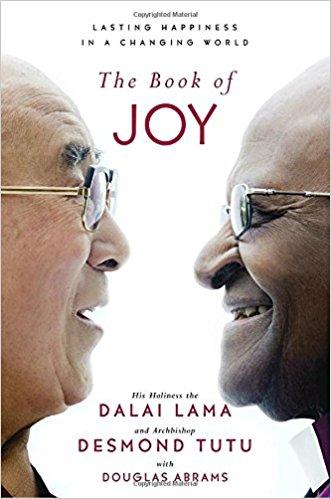The Book of Joy Summary
9 min read ⌚
“The Book of Joy Summary” will give you a taste of reality, and what a person needs to do in order to encounter a peaceful solution to all problems.
Lasting Happiness in a Changing World
We are constantly feeling stressed. Spiritual awakening has never been more crucial than now.
And who would know more about spirituality than Dalai Lama and Desmond Tutu, who share their knowledge in “The Book of Joy”?
Who Should Read “The Book of Joy”? And Why?
Soon after it was published, “The Book of Joy” was predicted to become one of the all-time favorite gift-books – up there, with Dr. Seuss’ “Oh, the Places You Will Go” and “Who Moved My Cheese?” And, of course, the prediction came true: who wouldn’t want to get a book on joy written by two Nobel Peace Prize winners?
We guess this rhetorical question gives an answer to the one posited in the title of this section. Everybody should read “The Book of Joy.” It’s written by a Buddhist and a Protestant Anglican – and that just shows you how much the message is universal. Not to mention – timeless.
People who are feeling down on life and those who don’t know how to connect will find much wisdom in this wonderful, little gem. Those who suffer will find consolation and peace. The rest – will find a manual to be happier and more joyful people!
About Dalai Lama and Desmond Tutu
 The 14th Dalai Lama is the spiritual leader of the Tibetan people and a Nobel Peace Prize recipient.
The 14th Dalai Lama is the spiritual leader of the Tibetan people and a Nobel Peace Prize recipient.
He was born in 1935 as Lhamo Thondup and renamed four years later as Jetsun Jamphel Ngawang Lobsang Yeshe Tenzin Gyatso, or Tenzin Gyatso for short. He became Tibet’s leader in 1950 and received his Nobel Peace Prize in 1989.
The current Dalai Lama is widely beloved and consulted on various questions.
 Desmond Tutu is a South African Anglican cleric, the Archbishop Emeritus of Cape Town, a civil rights activist, and a Nobel Peace Prize recipient.
Desmond Tutu is a South African Anglican cleric, the Archbishop Emeritus of Cape Town, a civil rights activist, and a Nobel Peace Prize recipient.
He was the first black man to become the Bishop of Johannesburg, as well as the first black Archbishop of Cape Town.
Before that, he was one of the fiercest critics of the South African racist policies, and, together with Nelson Mandela, the most prominent anti-apartheid activist.
He won the Nobel Peace Prize in 1984, five years before the Dalai Lama.
“The Book of Joy PDF Summary”
In April 2015, South-African human rights activist, the Most Revered Desmond Tutu, traveled to Dharamsala, India.
His goal?
To visit Tenzin Gyatso, the 14th Dalai Lama, and celebrate with him – though a few months early – his 80th birthday.
Now, Tutu isn’t a young man himself: four years older than the Dalai Lama, he was 84 at the time of this visit. At one point during their week-long conversation in Dharamsala, he even makes a joke about this: “You must shorten your answers,” he says to the Dalai Lama, who claims that they have plenty of time. “I am brief.”
It’s painful to think about it: unless someone ends aging fast, both of them – these two spiritual giants of the 20th century – will probably not be among us for long.
Now, we don’t really know what Tutu gave the Dalai Lama for his eightieth birthday. Fortunately, we do know what they both gave us afterward: “The Book of Joy.”
A kind of a structured transcript of their discussions in Dharmsala; and one of the most beautiful joint efforts to discover the nature of joy, the obstacles which stand before us to attain it, and the pillars upon which it is founded.
Expectedly, we didn’t hesitate for a second to include it in our list of best mindfulness books in history!
And, actually, that’s where the book starts: with a bittersweet discussion about the roots of its absence. Namely, mindfulness’ greatest nemeses. The obstacles to Joy.
Shut your eyes a bit: we’re going to list few words you dread!
Fear, stress, and anxiety. (Feeling nervous?) Frustration and anger. (Do you want to shout out loud?) Sadness and grief… Despair and loneliness. (Oh, how bad you want to hug someone right away…) Envy. (“That guy goes past yet again in his Mercedes-Benz…”) Adversity, illness, fear of death. (“And, you say, this is ‘The Book of Joy’, ha? Really?”)
That’s right – you know them well. Some of them – very well. They are the things which make you suffer – on a daily basis.
However – and this is the key takeaway from “The Book of Joy” – Tutu and the Dalai Lama claim that, despite its “dark” side, suffering, although constant, is essential to life. As the authors themselves say: nothing beautiful comes without some suffering.
Why?
Because it allows you to experience the positive moments more profoundly.
In fact, if you know how to use pain the proper way, it can become a constructive force. And to experience suffering the proper way, you need to shift your focus from yourself to others.
Observing yourself, according to lo-jong, the Buddhist mind training practice, will only cause sadness. What you need in life is to build up a mental immunity. If you do it, you will still feel pain, but you will recover far easier.
But how do you build up such immunity?
Well, the first step is understanding the nature of fear and frustration. You need to understand that fears are not rooted in reality – they are facets of your mind.
When you do understand this, you will also comprehend that by shifting your perspective you can find joy in any situation.
Most of the time you will face events that you cannot change.
Thinking about them and letting frustration build up will only do you harm. The only way you can control is your own reaction. So, what you should do is to accept the situation and use it as an opportunity to grow. And master the art of patience.
Yes, we understand that this is easier said than done, but it is possible to let go of stress.
Because the basis of most stress is fear.
Fear of failure, of not getting what you want, of disrespect, or of others not loving you. Fear, if you leave it unattended, can evolve into anger and then decrease the quality of your life. Control it before it’s too late.
If you want to lead a better life, you need to cultivate happiness.

And you can do this by building upon a strong foundation. The one made of the eight pillars of joy: perspective, humility, humor, acceptance, forgiveness, gratitude, compassion, and generosity.
1. Perspective means that there are many different angles to look at a thing. Taking a pause and looking at a problem a bit more open-mindedly may make you much happier than you’ll ever thought possible.
2. Humility – be humble and modest. As John C. Maxwell says wittily: “People with humility don’t think less of themselves; they just think of themselves less.”
3. Humor: joking is always better than not joking. Even if it means joking with your own faults. You are certainly not perfect – and that lifts a huge burden off your shoulders. Think about it.
4. Acceptance. This is where the change actually happens. More often than not, you can’t change reality. But you can change your attitude towards it.
5. Forgiveness. If you want to live in the present, forgiveness is your best shot at freeing yourself from the past. You’re doing everybody a favor.
6. Gratitude. Be thankful for everything. Starting with the very fact that you’re alive.
7. Compassion. Try to understand everybody. Stop comparing yourself to those more fortunate than you.
Compare yourself to those who have less. We’ve told you before: the very fact you’re able to read this article means that you’re more fortunate than about 4 billion people.
8. Generosity. Now that you understood the pain of others, be generous to them. Always offer than what you receive. And, in a way, you’ll actually receive the most.
Key Lessons from “The Book of Joy”
1. The Nature of Joy
2. The Obstacles to Joy
3. The Eight Pillars of Joy
The Nature of Joy
Most people would define joy along these lines: it is the absence of suffering. However, Tutu and the Dalai Lama think otherwise: they say that joy is what happens when you understand suffering.
It is all in your mind. You can think of suffering as something which hinders happiness – but, if so, be prepared to be unhappy. Because suffering is inevitable. If you can’t change it – why should you maximize its effects by worrying about it?.
Somehow, we think that the opposite is the only thing which makes sense.
The Obstacles to Joy
There are many things which may stand on your way to true joy. Fear, stress, and anxiety – almost on a daily basis. Frustration and anger – every time someone does something you don’t like. Sadness and grief… Despair and loneliness. Feelings which will inevitably come with some great loss. Envy – which makes you want more when you don’t really need it.
Adversity, illness, fear of death. You can’t stop them, can you?
The Eight Pillars of Joy
You should build your joy upon eight pillars: perspective, humility, humor, acceptance, forgiveness, gratitude, compassion, and generosity.
So, from now on – try to look at things from a different angle. Be humble and laugh out loud when someone’s making a joke about your faults. Accept reality when you can’t change it – and forgive those who harm you. Be grateful for what you have and feel compassionate with those who have less.
And be generous to them. It’s them who need some help to be happy. You already are.
Like this summary? We’d Like to invite you to download our free 12 min app, for more amazing summaries and audiobooks.
“The Book of Joy” Quotes
There’s a Tibetan saying: Wherever you have friends that’s your country, and wherever you receive love, that’s your home. Share on X The more time you spend thinking about yourself, the more suffering you will experience. Share on X Why be unhappy about something if it can be remedied? And what is the use of being unhappy if it cannot be remedied? Share on XWe create most of our suffering, so it should be logical that we also have the ability to create more joy. It simply depends on the attitudes, the perspectives, and the reactions we bring to situations and to our relationships with other… Share on X
The Book of Joy Summary Share on XOur Critical Review
Rarely you find a text written by not one – but two Nobel Prize winners. In fact, excepting some books or articles written by joint Nobel Prize winners, we’re not even sure that we can think of any other example at the moment.
The Book of Joy Summary explains that there’s nothing strange nor embracing when you are in need of happiness.
You win a Nobel Prize for being an original thinker, and unless you win it the same year with your co-author, the chances are you’re not really a pioneer.
In a nutshell, Nobel Prize winners don’t write what’s already written; but what hasn’t been written before.
However, there’s one Nobel Prize category, which is a bit different from the rest: the Peace Prize. Not because, unlike all the others, this one’s given out in Oslo, Norway.
But because it’s not really about being original and discovering something new. It seems that peace, just like the meaning of life, is fairly conventional.
But it takes a lot of courage, dedication, and self-sacrifice to attain it and share it with others.
Dalai Lama and Desmond Tutu should know this better than many. Both faced persecution for large periods of their lives; both had to live in exile.
In fact, most of the people reading this sentence haven’t been on Earth as long as Dalai Lama and Desmond Tutu have been soul-crushingly oppressed.
And yet – they managed to not only survive through it all but laugh it all away. They are “two of the most joyful people on the planet” – not despite their sufferings, but because of them.
And we guess this story tells a lot more about this book than any other, more conventional critical review.
If people who’ve suffered violently for more than half a century can be happy – why shouldn’t you be? And if they wrote a book teaching you few lessons – could you think of any excuse to not read it?
Especially today – when we need to tend the better angels of our nature just a little more to reach a world bereaved of violence.
Because, as the short review in “Time” magazine concludes, the questions analyzed by the Dalai Lama and Desmond Tutu in “The Book of Joy” “may be timeless, but their answer has urgent significance.”
Emir is the Head of Marketing at 12min. In his spare time, he loves to meditate and play soccer.








